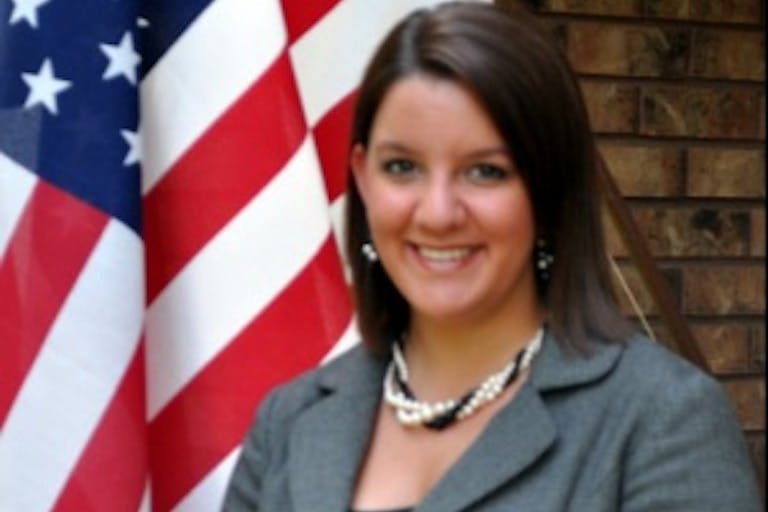
Report: Kansas abortions hit record high with 47% increase in minors
Nancy Flanders
·
Human Rights·By Deanna Wallace
My fight for free speech at LSU
I decided in seventh grade that one day I was going to attend Louisiana State University’s law school, and anyone who knows me can tell you that I’ve bled purple and gold ever since. So when I finally got there last fall, I never expected that in a few short months I would be involved in a lawsuit against the school.
It started in September, when I was gearing up for the 2012 Pro-Life Day of Silent Solidarity, which I’ve participated in for five years now. As part of the silent protest, participants hand out small cards explaining our silence and listing fetal development facts. I had never had any issues with this before, but LSU was different – it had Free Speech Alley. I had spoken to some of my friends who attend the undergraduate campus, and the general consensus was that students were allowed to pass out materials only in Free Speech Alley.
This concerned me, and I wanted to verify it, so I looked up the policy: “Distribution of Printed Material on Campus,” on page 28 of the Student Organization Policy Handbook, which listed the office in charge, strangely, as the Finance and Administration Office. I called and spoke to the assistant to our vice chancellor and chief financial officer. I gave her the details of my event, “Pro-Life Day of Silent Solidarity,” and told her I was concerned with where I was allowed to pass out my small informational flyers.
She asked me if I was doing this event with a student organization, and told her I was participating on my own, and I was told that I still had to follow the same rules as a student organization.
I was then told that those policies dictated that I could pass out the flyers only if I was in the area known as “Free Speech Alley,” which is a small stretch (about 24 yards) of sidewalk near the LSU Student Union. Also, if I wanted to pass flyers out in Free Speech Alley, I would need to register my event with Campus Life (pg. 19 of Student Org. Policy Manual), as Free Speech Alley has limited space available each day. When I asked if there was an exception if someone asked for one of my flyers, I was told that in that circumstance, I could hand it to him – but only if he asked. I then confirmed all this in a separate phone call with the coordinator for the LSU Finance and Administrative Services office.
The summer before I came to LSU, I was privileged to have attended ADF’s initial Collegiate Academy, where I was first introduced to their Speak Up program that provides university students with resources and legal help with unconstitutional, restrictive speech codes on their campuses. With this in mind, I decided to contact attorneys at Alliance Defending Freedom, who advised me that this was an unconstitutional violation of my First Amendment rights.
The big decision came next – should I file a lawsuit? On one hand, I would be standing up for my constitutional rights, and making the campus a better place for my fellow students; on the other hand, I might be targeted by unwelcome attention, or punished in some way. I sought the advice of my parents, husband, and in-laws, and did a lot of praying before finally deciding that a lawsuit was the right thing to do.
The lawsuit never went to court. Instead, LSU agreed to revise its speech policy, and the new policy was released last week. Under the newly clarified speech policy, my fellow LSU students are free to distribute literature almost anywhere on campus, and they do not have to obtain prior approval!
I am extremely humbled that I was able to help make this change happen, and I’m thrilled that the new policy will ensure that I and my fellow LSU students are able to freely exercise our freedom of speech. It was a hard decision, but I know that it was the right one, and the attorneys at ADF were so patient and helpful, making sure that I understood exactly what was going on at all times.
If your university has a Free Speech Alley or a restrictive speech policy, I would encourage you to contact ADF and make a stand for free speech on your campus!
Live Action News is pro-life news and commentary from a pro-life perspective.
Contact editor@liveaction.org for questions, corrections, or if you are seeking permission to reprint any Live Action News content.
Guest Articles: To submit a guest article to Live Action News, email editor@liveaction.org with an attached Word document of 800-1000 words. Please also attach any photos relevant to your submission if applicable. If your submission is accepted for publication, you will be notified within three weeks. Guest articles are not compensated (see our Open License Agreement). Thank you for your interest in Live Action News!

Nancy Flanders
·
Human Rights
Angeline Tan
·
Human Rights
Bridget Sielicki
·
Human Rights
Carole Novielli
·
International
Angeline Tan
·
Human Rights
Nancy Flanders
·